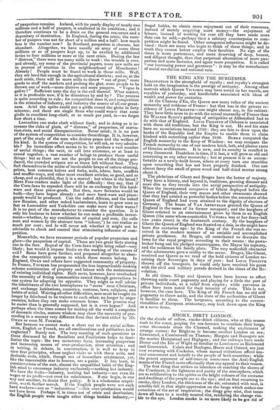THE KING AND THE BURGESSES.
IMAGINATION is the stronghold of royalty ; and royalty's strongest hold on the imagination is the prestige of antiquity. Among other marvels which Queen VICTORIA may have noted on her travels, are royalties of yesterday, and handicrafts associated with ideas of wealth and power for centuries.
At the Chateau d'Eu, the Queen saw many relics of the ancient monarchy and noblesse of France : but that was in the private re- sidence of Lours PHILIPPE—one might almost say, in his cabinet. They have little more to do with the actual monarchy of France than Sir WALTER SCOTT'S gathering of antiquities at Abbotsford had to do with that of England. Louis Prmares of Orleans is associated with these old traditions, but the King is not. He and his state have no associations beyond 1789: they are fain to draw upon the banks of the Republic and the Empire to enable them to claim kindred with something earlier than 1830. BURKE compared the English monarchy to the Keep of Windsor : we may compare the French monarchy to one of our modern brick, lath, and plaster casts of Grecian architecture. It is new, and its novelty is recalled in every lineament. Doubtless in time, if it last, it will grow as old and interesting as any other monarchy ; but at present it is as uncom- fortable as a newly-built house, where at every turn one stumbles upon something that has not been properly finished. One can almost fancy the smell of green wood and half-dried mortar strong about it.
The plebeians of Ghent and Bruges have the better of majesty. They have a history, and beyond it, traditions, growing dimmer and more dim as they recede into the aerial perspective of antiquity. When the incorporated companies of Ghent deployed before the Queen of England, their very maces and other ornaments showed that they had existed as powerful bodies before the ancestors of the Queen of England had even attained to the dignity of electors of Germany. The house of VAN ARTEVELDE greeted the Queen of England in the name of its former occupant ; and the burghers of Ghent referred to an entertainment given by them to an English Queen (the same whose counterfeit VICTORIA was at her fancy-ball two years since) in the fourteenth century. By the burghers of Ghent the Queen of England was feasted on a dais, as she might have been five centuries ago : by the King of the French she was re- ceived in the modern manner of an amiable and accomplished private gentleman. At Bruges, all contributed to decorate the town for the royal progress according to their means : the pawn- broker hung out his pledged counterpanes, the Mayor his tapestry, and the nobleman his family plate. The very makeshift character of the adornments gave a reality to the scene. Bruges, like Ghent, received our Queen as we read of the bold citizens of London re- ceiving their Sovereigns in days of yore : had Lours PHILIPPE thrown off the bourgeois, he could only have received his guest with the civil and military parade devised in the times of the Re- volution.
In old times, Kings and Queens have been known to affect throwing aside court pageantry and playing for a little the part of private individuals, as a relief from empire ; while parvenus in office have been noted for their tenacity of state. This is not, however, the case here. The King of the French has no old stiff pageantry to throw aside, and the state of the authorities of Ghent is familiar to them. The burgesses, according to the conven- tionalities of European aristocracy, may look down upon the King as a :toms homo.


























 Previous page
Previous page